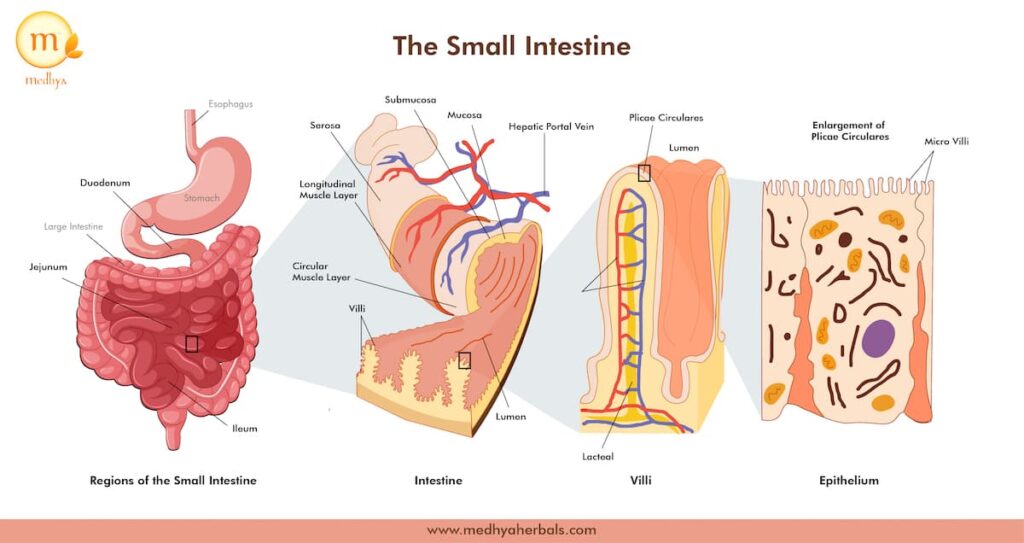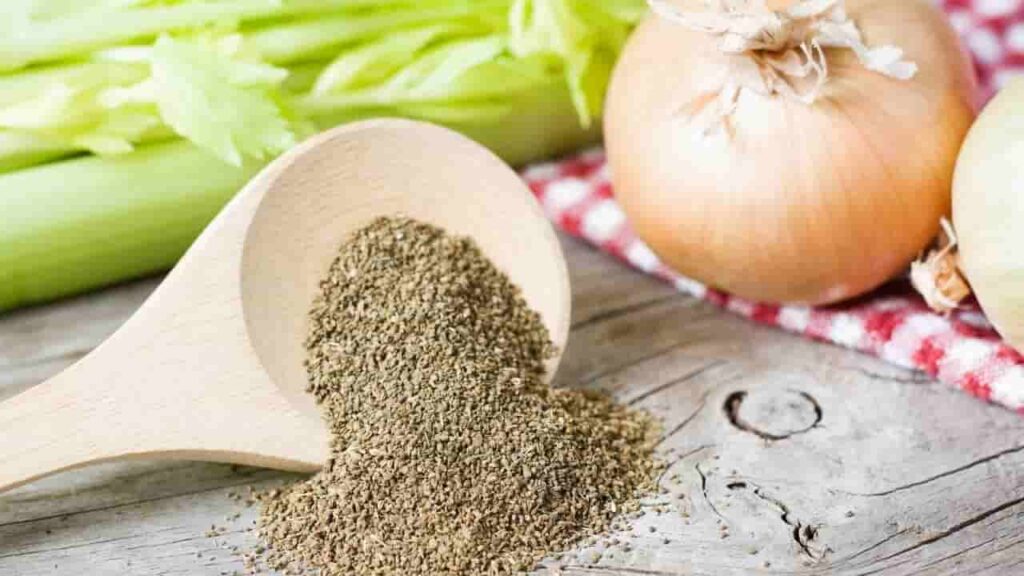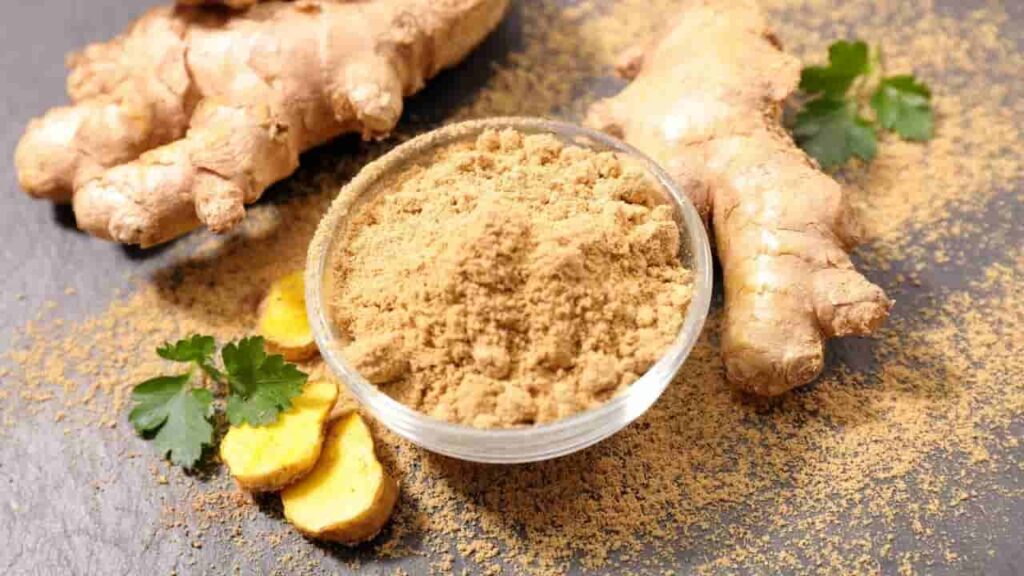As an Ayurvedic doctor, I’ve seen numerous cases of Small Intestinal Bacterial Overgrowth (SIBO) bloating and its debilitating symptoms. SIBO bloating can cause discomfort, pain, and embarrassment, and it affects millions of people worldwide, particularly women.
SIBO occurs when there is an overgrowth of bacteria in the small intestine, leading to a variety of uncomfortable symptoms, such as bloating, constipation, abdominal pain, or irregular bowel movements. This condition can also cause malabsorption of essential nutrients, leading to deficiencies and chronic health issues.
If you’re experiencing SIBO symptoms, it’s crucial to get a proper diagnosis from a healthcare professional. Once diagnosed, there are natural ways to manage SIBO symptoms without resorting to harsh medications or antibiotics.
In this blog post, we’ll cover everything you need to know about SIBO bloating, including its symptoms, causes, and natural remedies to alleviate the discomfort. You’ll also learn about the SIBO diet, which foods to avoid, and which foods can help you manage your symptoms. We’ve got you covered with research-backed information and practical advice to help you take control of your SIBO bloating and enjoy a healthier, happier life.

Understanding SIBO Bloating
SIBO bloating is a common symptom experienced by those with Small Intestinal Bacterial Overgrowth (SIBO), a condition that occurs when there is an overgrowth of bacteria in the small intestine. This overgrowth leads to the production of excess gas, which can cause bloating, abdominal pain, and discomfort.
Bloating is described as a feeling of fullness or tightness in the abdomen. It can be accompanied by other symptoms such as gas, burping, and abdominal cramping.
What Causes SIBO Bloating?
Normally, the small intestine has relatively few bacteria compared to the large intestine, and these bacteria are essential for digestion and absorption of nutrients.
However, when there is an overgrowth of bacteria in the small intestine, they can ferment carbohydrates and produce gases such as methane and hydrogen. This fermentation process leads to the production of gas, which can cause bloating and discomfort in the abdomen.
Excess Gas in SIBO & Related Digestive Problems
The gas produced by the bacteria in the small intestine can also cause other symptoms such as burping and flatulence. The bacteria can also cause inflammation in the small intestine, leading to further gastrointestinal symptoms.

The bloating associated with SIBO is caused by the gas produced by the bacteria in the small intestine. This gas can accumulate in the intestines, leading to pressure and discomfort. The bloating may be accompanied by other symptoms such as abdominal pain, diarrhea, constipation or both.
The excess gas production in SIBO can also affect other body parts. For example, the gas produced by the bacteria can move up into the stomach and cause acid reflux, leading to further discomfort and heartburn.
Malabsorption and Leaky Gut in SIBO
In addition, the bacteria in the small intestine can interfere with the absorption of nutrients, leading to malnutrition and other health problems. The inflammation caused by SIBO can also lead to a leaky gut, where the lining of the intestine becomes more permeable, allowing harmful substances to enter the bloodstream and cause further health problems.
How Does SIBO Bloating Feel Like?
Bloating tends to happen the most after meals when the bacteria in the small intestine are stimulated to produce gas. However, some people with SIBO may experience bloating and discomfort throughout the day, regardless of whether they have eaten or not.
SIBO bloating can feel like your stomach is distended or swollen. You may feel like your stomach is full even when you haven’t eaten.
The location of the pain and discomfort associated with SIBO bloating can vary. Some people may experience pain in the upper abdomen, while others may feel it in the lower abdomen. The pain may be sharp or dull and can be accompanied by a feeling of fullness or pressure.
SIBO bloating can significantly impact a patient’s quality of life. It can lead to social discomfort, reduced appetite, and decreased physical activity due to discomfort and embarrassment. Patients may feel self-conscious about their appearance due to bloating, leading to a negative impact on their mental health.
Natural Remedies for SIBO
Proper use of natural remedies for SIBO can be helpful to significantly reduce the inflammation in the gut, control the bacterial overgrowth and promote a healthy gut microbiome. Thus, natural remedies such as herbs and foods can control SIBO symptoms and prevent gas and bloating.
However, it’s important to note that natural remedies should be used in conjunction with SIBO treatment, not as a substitute for it. An Ayurvedic doctor can advise you proper use of herbs according to your body type.
Here are some highly effective natural remedies to stop bloating and digestive discomforts in SIBO:

1. Aloe vera
Aloe vera has anti-inflammatory and antibacterial properties that can help to reduce inflammation in the gut and kill off harmful bacteria that contribute to SIBO.
Aloe vera can provide short-term relief from SIBO symptoms by reducing inflammation and bloating in the gut. It can also help to improve long-term gut health by promoting the growth of beneficial bacteria and reducing the growth of harmful bacteria.
How to Take Aloe Vera for SIBO?
To use aloe vera as a natural remedy for SIBO bloating, you can consume aloe vera juice or gel. Aloe vera juice can be found in health food stores or online, and can be consumed on its own or added to smoothies or other beverages. Aloe vera gel can be added to smoothies or other recipes, or taken in supplement form.
To increase the absorption of aloe vera, it’s important to take it on an empty stomach, preferably in the morning. You can also take aloe vera with a source of fat, such as coconut oil or avocado, to help increase absorption.
Caution with Aloevera
It’s important to note that aloe vera can have a laxative effect, so it’s important to start with a small amount and gradually increase the dosage to avoid any unwanted side effects. It’s also important to consult with a healthcare professional before using aloe vera as a natural remedy, especially if you are pregnant, breastfeeding, or taking medication.

2. Celery Seeds
Celery seeds have been used for centuries as a natural remedy for various ailments, including digestive issues such as bloating and gas. Recent research has shown that celery seeds can also be effective in providing relief for individuals with SIBO bloating. Here are some ways in which celery seeds can help:
- Anti-inflammatory properties: Celery seeds are rich in antioxidants and compounds that have anti-inflammatory properties, which can help to reduce inflammation in the gut that contributes to SIBO bloating.
- Antimicrobial activity: Celery seeds contain compounds such as apigenin and luteolin that have antimicrobial properties, which can help to reduce the growth of harmful bacteria that contribute to SIBO.
- Promotes healthy digestion: Celery seeds are known to have carminative properties, which means they can help to relieve gas and bloating in the digestive tract. This can help to reduce SIBO symptoms such as bloating, gas, and abdominal pain.
- Increases bile production: Celery seeds are known to stimulate the production of bile in the liver, which can help to improve digestion and reduce SIBO symptoms such as bloating and abdominal discomfort.
- Supports gut health: Celery seeds contain prebiotic fibers that can help to promote the growth of beneficial bacteria in the gut. This can help to improve gut health and reduce SIBO symptoms.
How to take Celery Seeds for Relief from SIBO?
To use celery seeds as a natural remedy for SIBO bloating, you can consume them in whole seed form or as a supplement. Celery seeds can be added to smoothies, salads, soups, or other recipes, or taken in supplement form.
To increase the absorption of celery seeds, it’s important to grind them into a fine powder before consuming them. You can do this with a mortar and pestle or a spice grinder. Consuming celery seeds with a source of fat, such as olive oil or avocado, can also help to increase absorption.
It’s important to note that celery seeds can interact with certain medications, such as blood thinners or diuretics, so it’s important to consult with an Ayurvedic doctor before using celery seeds as a natural remedy. It’s also important to start with a small amount and gradually increase the dosage to avoid any unwanted side effects.

3. Fennel
Fennel is a common herb that is often used in Ayurvedic medicine to treat a variety of digestive issues, including bloating caused by SIBO. This herb contains anethole, a compound that is known to have antispasmodic properties that can help relax the digestive tract and alleviate bloating and gas.
Studies have shown that fennel can be effective in reducing symptoms of SIBO bloating. One study found that participants who took fennel oil capsules for four weeks experienced a significant reduction in bloating and other digestive symptoms compared to those who took a placebo.
How to Take Fennel for SIBO?
To include fennel in your SIBO bloating relief regimen, you can use fennel seeds, fennel tea, or fennel oil. Fennel tea can be made by steeping a teaspoon of crushed fennel seeds in hot water for 10 minutes. Fennel oil can be added to a carrier oil and massaged onto the abdomen, or you can take fennel oil capsules as a supplement.
To increase the absorption of fennel, it is best to consume it after meals when the digestive system is already active. You can also try pairing fennel with other digestive herbs, such as ginger or peppermint, to enhance its effectiveness.
Overall, fennel is a safe and natural way to alleviate SIBO bloating and improve digestive health. However, as with any supplement, it is important to talk to your doctor before incorporating fennel into your SIBO treatment plan.

4. Oregano
Oregano is an aromatic herb that is commonly used as a spice in Mediterranean and Mexican cuisine. It is also known for its therapeutic properties and has been used for centuries to treat various health conditions. Oregano has anti-inflammatory, anti-microbial, and anti-fungal properties that can be beneficial in treating SIBO.
Oregano contains carvacrol and thymol, which are two potent compounds that have been shown to inhibit the growth of bacteria in the gut, including the bacteria that cause SIBO. These compounds can also reduce inflammation in the gut, which can help to alleviate bloating and other digestive symptoms associated with SIBO.
One study found that taking a combination of oregano oil and probiotics significantly reduced symptoms of SIBO, including bloating and abdominal pain. Another study found that oregano oil was effective in reducing gas and bloating in people with SIBO.
How to Take Oregano for SIBO?
To include oregano in your diet, you can add fresh or dried oregano to your meals, or you can take oregano oil supplements. It’s best to take oregano oil supplements under the guidance of a healthcare professional, as they can be quite potent and may interact with certain medications.
To increase the absorption of oregano, it’s recommended to take it with a meal that contains some fat. Oregano can also be combined with other natural remedies for SIBO, such as fennel and ginger, to enhance its therapeutic effects.

5. Ginger
Ginger is a popular natural remedy for various digestive issues, including SIBO bloating. Its anti-inflammatory and anti-spasmodic properties make it an effective natural treatment option. Ginger helps to soothe the gut lining and reduce inflammation, which can alleviate symptoms of bloating in the short term. Furthermore, ginger can improve digestion by increasing the production of digestive enzymes and reducing the amount of time food stays in the digestive tract.
A study published in the Journal of Gastroenterology and Hepatology found that ginger was effective in reducing symptoms of bloating in patients with functional dyspepsia, which is a condition characterized by digestive symptoms such as bloating, nausea, and stomach pain. The study participants received either ginger capsules or a placebo for four weeks, and those who received ginger capsules reported a significant reduction in bloating symptoms compared to the placebo group.
Another study published in the World Journal of Gastroenterology found that ginger helped to improve gastric emptying, which is the process by which food moves from the stomach to the small intestine. The study participants were given a ginger solution before a meal, and their gastric emptying time was measured. The results showed that ginger significantly accelerated gastric emptying, which may help to reduce symptoms of bloating and improve overall digestive health.
How to Take Ginger for SIBO?
To include ginger in your diet, you can add it to your meals as a spice or steep it in hot water to make ginger tea. Chewing on a small piece of raw ginger or taking ginger supplements may also provide relief from SIBO bloating. However, it is important to note that excessive consumption of ginger may cause heartburn or aggravate acid reflux symptoms in some individuals.
To increase the absorption of ginger, it is recommended to consume it with a source of fat, such as coconut oil or nuts. This can help to improve the absorption of ginger’s active compounds, such as gingerols and shogaols, which have been shown to have anti-inflammatory and anti-spasmodic effects on the digestive system.
Conclusion
SIBO can be a challenging condition to manage and finding relief from the bloating and discomfort can be a frustrating process. However, with the help of natural remedies like aloe vera, celery seeds, oregano, and ginger, you can find relief from your symptoms in the short term and improve your overall health in the long term. These remedies have been used for centuries in Ayurvedic medicine and have been shown to be effective in treating SIBO symptoms.
If you’re struggling with SIBO symptoms and are interested in a personalized treatment plan, we encourage you to schedule a consultation with Medhya Herbals Ayurvedic Doctors. Our team of experienced practitioners can help you identify the root cause of your SIBO and provide personalized natural remedies and dietary recommendations to support your long-term health.
We understand how challenging SIBO can be, and we want to help you on your journey towards optimal health. Our team of Ayurvedic doctors is here to guide you every step of the way, from diagnosis to treatment to follow-up care. Don’t wait any longer to find relief from SIBO bloating and other symptoms. Schedule a consultation with us today.
FAQ
What does SIBO stool look like?
In SIBO, the bacterial overgrowth in the small intestine can cause malabsorption and incomplete digestion of food, leading to changes in the stool. Some common changes include an increase in the amount of undigested food particles, such as fibers or fat, visible in the stool. These may appear as small white or yellowish specks or may make the stool appear bulky, greasy, or floaty.
SIBO can also cause changes in the color and odor of the stool. In some cases, the stool may appear gray or pale due to a lack of bile salts, which are necessary for proper digestion and absorption of fats. The odor may be foul or pungent due to the fermentation of undigested carbohydrates by the overgrown bacteria.
It’s essential to note that other conditions can also cause similar changes in stool appearance. Therefore, it’s crucial to seek medical evaluation and diagnosis before attempting any self-treatment for SIBO or any other gastrointestinal issue.
What does a SIBO flare up feel like?
SIBO (Small Intestinal Bacterial Overgrowth) flare-ups can vary in intensity and duration, and the symptoms can differ from person to person. However, some common symptoms of a SIBO flare-up include:
- Abdominal pain or discomfort: The most common symptom of a SIBO flare-up is abdominal pain or discomfort, which may be crampy, bloating, or a general sense of discomfort in the abdomen.
- Diarrhea or constipation: SIBO Flare-ups can also cause changes in bowel movements, such as diarrhea, constipation, or alternating between the two.
- Nausea and vomiting: Some people may experience nausea and vomiting during a SIBO flare-up, particularly if the overgrowth is severe.
- Fatigue: SIBO flare-ups can cause fatigue and exhaustion, as the body works to fight off the bacterial overgrowth and process the undigested food.
- Skin issues: Some people with SIBO may experience skin issues such as acne, rashes, or eczema during flare-ups due to the bacterial overgrowth and the resultant inflammation.
Does SIBO make you poop a lot?
SIBO (Small Intestinal Bacterial Overgrowth) can cause changes in bowel movements, but it doesn’t necessarily mean that you will poop a lot. In fact, SIBO can lead to either diarrhea or constipation or alternating between the two.
When there is bacterial overgrowth in the small intestine, it can interfere with the digestion and absorption of food, leading to diarrhea or loose stools. The bacteria can also produce excess gas, leading to bloating and discomfort. On the other hand, SIBO can slow down the movement of food through the intestines, causing constipation.
It’s essential to note that other factors can also affect bowel movements, such as diet, stress, and medication. If you are experiencing changes in bowel movements or other gastrointestinal symptoms, it’s best to consult a healthcare provider for proper diagnosis and treatment. They can help determine the underlying cause and recommend appropriate treatment, which may include antibiotics, dietary changes, or probiotics, depending on the severity and type of SIBO.
References
Zhang, Y., Li, L., Guo, C., Mu, Q., Han, L., Liu, X., … & Li, X. (2020). The therapeutic potential of oregano essential oil on the repair of intestinal mucosal barrier dysfunction caused by enterotoxigenic Escherichia coli in weaned piglets. Food & function, 11(3), 2248-2259. https://pubmed.ncbi.nlm.nih.gov/32016275/
Alinejad-Mofrad, S., Faramarzi, M. A., & Naghibi, F. (2018). The effect of ginger on gut microbiota, and chronic idiopathic urticaria: A randomized, double-blind, placebo-controlled clinical trial. Phytotherapy research, 32(10), 2107-2113. https://pubmed.ncbi.nlm.nih.gov/29989374/
Rhee, S. H., Pothoulakis, C., & Mayer, E. A. (2009). Principles and clinical implications of the brain-gut-enteric microbiota axis. Nature Reviews Gastroenterology & Hepatology, 6(5), 306-314. https://www.nature.com/articles/nrgastro.2009.35
Bar-Sela, G., Cohen, M., Ben-Arye, E., & Epelbaum, R. (2015). The medical necessity for drying Aloe vera gel: Contribution of phytochemistry. Israel Journal of Plant Sciences, 62(3), 182-190. https://www.tandfonline.com/doi/abs/10.1080/07929978.2014.1003567
Semwal, R. B., Semwal, D. K., Combrinck, S., & Viljoen, A. M. (2015). Gingerols and shogaols: important nutraceutical principles from ginger. Phytochemistry, 117, 554-568. https://pubmed.ncbi.nlm.nih.gov/25940133/
Mahmood, T., Akhtar, M. S., Khan, A., & Khan, M. A. (2015). Chemical composition, antioxidant and antimicrobial activities of basil (Ocimum basilicum) essential oils depends on seasonal variations. Natural product research, 29(23), 2168-2174. https://pubmed.ncbi.nlm.nih.gov/25348433/
Ozcan, M. M., Sagdic, O., & Ozkan, G. (2015). Antimicrobial activity of essential oils of ginger (Zingiber officinale) and garlic (Allium sativum) against Escherichia coli O157: H7, Listeria monocytogenes 4b and Salmonella enterica Serovar Typhimurium. Journal of the science of food and agriculture, 95(2), 306-314. https://onlinelibrary.wiley.com/doi/abs/10.1002/jsfa.6749
Khater, H. F., El-Sayed, Y. S., & Abouzied, M. M. (2019). Antimicrobial activity of some essential oils and their major components against Escherichia coli strains. Annals of agricultural sciences, 64(1), 1-8. https://www.sciencedirect.com/science/article/pii/S0570178319300022

